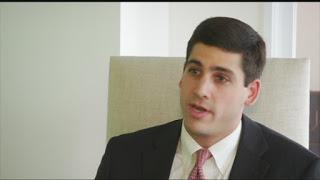
Joseph Siegelman
(From wiat.com)
U.S. District Judge Madeline Haikala (Northern District of Alabama) issued an order on March 31, 2017, for the DOJ's Office of Professional Responsibility (OPR) to turn over the requested documents, many of which apparently involve the alleged recusal of former U.S. Attorney Leura Canary in the Siegelman case. OPR gave notice on April 10 that it had submitted the requested information.
That sounds encouraging. Joseph Siegelman, the former governor's son, submitted a Freedom of Information Act (FOIA) request in June 2015, only to receive stonewalling from OPR. In January 2016, Joseph Siegelman filed a lawsuit in the Northern District of Alabama, leading to Haikala's order that OPR turn over the requested documents -- and OPR's notice that it had, in fact, turned them over.
What happens next? If Haikala and OPR act with integrity -- and those are big "ifs" -- it could generate one of the biggest bombshells in the history of the American justice system. It could show how Siegelman was railroaded, and who exactly was behind the scheme. It could show that the DOJ is more of a crime-producing organization than a crime-fighting outfit. It could threaten the careers of numerous lawyers, prosecutors, and political figures.
But caveats are planted within the case, which is styled Joseph Siegelman v. United States Department of Justice, et al. According to the case docket, Haikala's ruling calls for an in camera review of the OPR documents. In camera is Latin for "in the chamber," meaning the documents will be reviewed in private, with the press and public excluded. It could mean the OPR documents, no matter how much corruption they reveal, could never see the light of day.
In OPR's notice of April 10, it refers to "Submission of Ex Parte, In Camera Material." Ex Parte is Latin for "from the party," and generally refers to a decision that is made with only one party to the controversy present. Does that mean the government is seeking to keep Joseph Siegelman and his attorneys locked out of any document review? Is this some kind of "double-secret probation"? Is this a form of blatant "bad faith" from the government? Given the government's conduct in the Siegelman matter, the answer probably is yes.
In another form of "trust me" justice, the public might be forced to assume OPR actually turned over all relevant documents. In theory, OPR lawyers could be subject to serious sanctions for withholding any documents. But could they, in reality, hold back the most damning documents and get away with it? Considering the behavior of judges and prosecutors throughout the Siegelman matter, the answer clearly is "yes."
Those who have followed the Siegelman case know we have been down this road before. U.S. Magistrate Charles S. Coody (Middle District of Alabama) wrote in a June 2012 order that he had reviewed documents requested by Siegelman and codefendant Richard Scrushy and found "no exculpatory matter" that would "further their claims." Lawyers for Siegelman and Scrushy later filed documents showing Coody never even ordered the requested documents -- and he certainly never reviewed them. In other words, Coody lied -- probably to cover up for federal prosecutors.
The road to seeking government documents has been long and winding in the Siegelman case. It started with a FOIA request in 2006, a FOIA lawsuit in 2009, and years of stonewalling by both the George W. Bush and Barack Obama administration.
Are these documents sensitive? Well, the government has covered them up for 11 years, when both Republicans and Democrats controlled the White House. That has led to the current Joseph Siegelman lawsuit, with OPR supposedly turning over the documents and Haikala supposedly set to act with integrity while reviewing them outside of public view.

Madeline Haikala
Is there any reason to trust this process, to believe it will be carried out honestly? It will require a form of blind trust. Nothing in the history of the Siegelman case suggests our justice system is capable of handling this matter with integrity.It all comes down to this: Can Judge Madeline Haikala be trusted? She is an Obama appointee, but given his dismal record on justice issues, that provides little grounds for hope.
We do not have access to the full case file, but these words from Joseph Siegelman's complaint are . . . well, we'll let you make the call. Here is what Joseph Siegelman asked for in his original complaint:
Plaintiff respectfully requests that this Honorable Court (1) issue an injunction ordering Defendant to disclose the requested documents, (2) provide for the expeditious processing of this action, (3) award Plaintiff reasonable attorney fees and other litigation costs incurred by Plaintiff in this action, exclusive of pro bono services rendered, and (4) order any other relief this court deems just and proper.
You will notice that Joseph Siegelman did not ask for an in camera review. He asked for the requested documents to be disclosed, for "expeditious processing" of the case, and for attorney fees and litigation costs, plus any other proper relief.
Here is another key point: Joseph Siegelman included a jury demand in his complaint. We are not experts on FOIA law, but the jury demand indicates all, or many, of these issues lawfully could be determined by a jury. That suggests Siegelman is seeking transparency, while OPR probably wants no part of a jury.
We see no indication that Siegelman wants the process kept from view of the public or press, to be decided behind closed doors by a one-woman censor/judge. The in camera angle apparently entered the picture at the government's insistence -- and with Haikala's approval -- during consideration of multiple summary-judgment motions.
The potentially monumental repercussions of this case cannot be overstated. It threatens the careers of numerous legal and political figures. It could turn the DOJ upside down, bringing extensive review and much-need changes for a corroded system that is badly broken. Depending on statute-of-limitations issues, it could lead to criminal sanctions and perhaps millions of dollars in civil damages.
Our experience has been that federal judges are driven to protect the status quo. They benefit from a system that is in stasis, and they tend to rule with self-interest in mind. But if Madeline Haikala proves to have iron-clad integrity and the "stones" to invite transparency, justice might finally be on the horizon in the Siegelman case -- and the DOJ could be set for a shake-up of historic proportions.
